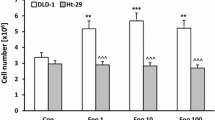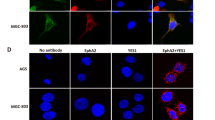Abstract
Erythropoietin (EPO), binding with its receptor (EPOR), plays an important role in erythropoiesis. EPOR is reported to be expressed in various non-hematopoietic cancers, including gastric cancer. Although recombinant human EPO (rhEPO) has been widely used clinically in anemia patients, it remains controversial whether it would promote tumor progression. In this study, we used siRNA interference method to downregulate EPOR expression to investigate the function of EPO/EPOR pathway in human gastric cancer cells. We found EPOR expressed significantly higher in gastric cancer tissues, and also in most gastric cancer cell lines. RhEPO promoted gastric cancer cell proliferation, migration in AGS cells, and promoted cells from G0/G1 stage to G2/M stage, but had no regulation on AGS cell apoptosis. Downregulation of EPOR expression by siRNA interference in AGS cells resulted in no significant effects on proliferation and invasiveness of the cells, but induced apoptosis (p < 0.05). Xenografted gastric tumor model was used to explore the effect of EPOR-overexpression on gastric cancer cells in vivo. Our result showed that overexpression of EPOR enhanced tumor formation in nude mice (p < 0.01). Our results suggest that EPO/EPOR pathway promotes gastric cancer formation, proliferation, migration, and decreases apoptosis.






Similar content being viewed by others
References
Lambert R, Guilloux A, Oshima A, et al. Incidence and mortality from stomach cancer in Japan, Slovenia and the United States. Int J Cancer. 2002;20:811–8.
Thomaidis T, Weinmann A, Sprinzl M, et al. Erythropoietin treatment in chemotherapy-induced anemia in previously untreated advanced esophagogastric cancer patients. Int J Clin Oncol. 2014;19:288–96.
Littlewood TJ, Bajetta E, Nortier JW, Vercammen E, Rapoport B. Effects of epoetin alfa on hematologic parameters and quality of life in cancer patients receiving nonplatinum chemotherapy: results of a randomized, double-blind, placebo-controlled trial. J Clin Oncol. 2001;19:2865–74.
Osterborg A, Brandberg Y, Molostova V, et al. Randomized, double-blind, placebo-controlled trial of recombinant human erythropoietin, epoetin Beta, in hematologic malignancies. J Clin Oncol. 2002;20:2486–94.
Hedenus M, Adriansson M, San MJ, et al. Efficacy and safety of darbepoetin alfa in anaemic patients with lymphoproliferative malignancies: a randomized, double-blind, placebo-controlled study. Br J Haematol. 2003;122:394–403.
Henke M, Laszig R, Rube C, et al. Erythropoietin to treat head and neck cancer patients with anaemia undergoing radiotherapy: randomised, double-blind, placebo-controlled trial. Lancet. 2003;362:1255–60.
Wright JR, Ung YC, Julian JA, et al. Randomized, double-blind, placebo-controlled trial of erythropoietin in non-small-cell lung cancer with disease-related anemia. J Clin Oncol. 2007;25:1027–32.
Thomas G, Ali S, Hoebers FJ, et al. Phase III trial to evaluate the efficacy of maintaining hemoglobin levels above 12.0 g/dL with erythropoietin vs above 10.0 g/dL without erythropoietin in anemic patients receiving concurrent radiation and cisplatin for cervical cancer. Gynecol Oncol. 2008;108:317–25.
Aapro M, Leonard RC, Barnadas A, et al. Effect of once-weekly epoetin beta on survival in patients with metastatic breast cancer receiving anthracycline- and/or taxane-based chemotherapy: results of the Breast Cancer-Anemia and the Value of Erythropoietin (BRAVE) study. J Clin Oncol. 2008;26:592–8.
Bennett CL, Silver SM, Djulbegovic B, et al. Venous thromboembolism and mortality associated with recombinant erythropoietin and darbepoetin administration for the treatment of cancer-associated anemia. JAMA. 2008;299:914–24.
Bohlius J, Schmidlin K, Brillant C, et al. Recombinant human erythropoiesis-stimulating agents and mortality in patients with cancer: a meta-analysis of randomised trials. Lancet. 2009;373:1532–42.
Hedley BD, Allan AL, Xenocostas A. The role of erythropoietin and erythropoiesis-stimulating agents in tumor progression. Clin Cancer Res. 2011;17:6373–80.
Dicato M, Plawny L. Erythropoietin in cancer patients: pros and cons. Curr Opin Oncol. 2010;22:307–11.
Lacombe C, Mayeux P. Biology of erythropoietin. Haematologica. 1998;83:724–32.
Finucane ML, Slovic P, Mertz CK. Public perception of the risk of blood transfusion. Transfusion. 2000;40:1017–22.
Volgger B, Kurz K, Zoschg K, et al. Importance of erythropoetin receptor expression in tumour tissue for the clinical course of breast cancer. Anticancer Res. 2010;30:3721–6.
Westenfelder C, Baranowski RL. Erythropoietin stimulates proliferation of human renal carcinoma cells. Kidney Int. 2000;58:647–57.
Hardee ME, Arcasoy MO, Blackwell KL, Kirkpatrick JP, Dewhirst MW. Erythropoietin regulates tumour growth of human malignancies. Clin Cancer Res. 2006;12:332–9.
Hedley BD, Chu JE, Ormond DG, et al. Recombinant human erythropoietin in combination with chemotherapy increases breast cancer metastasis in preclinical mouse models. Clin Cancer Res. 2011;17:6151–62.
Welsch T, Zschabitz S, Becker V, et al. Prognostic significance of erythropoietin in pancreatic adenocarcinoma. PLoS ONE. 2011;6, e23151.
Gombos Z, Danihel L, Repiska V, Acs G, Furth E. Expression of erythropoietin and its receptor increases in colonic neoplastic progression: the role of hypoxia in tumorigenesis. Indian J Pathol Microbiol. 2011;54:273–8.
Abhold E, Rahimy E, Wang-Rodriguez J, et al. Recombinant human erythropoietin promotes the acquisition of a malignant phenotype in head and neck squamous cell carcinoma cell lines in vitro. BMC Res Notes. 2011;4:553.
Lin YT, Chuang HC, Chen CH, et al. Clinical significance of erythropoietin receptor expression in oral squamous cell carcinoma. BMC Cancer. 2012;12:194.
Wang L, Li HG, Xia ZS, Wen JM, Lv J. Prognostic significance of erythropoietin and erythropoietin receptor in gastric adenocarcinoma. World J Gastroenterol. 2011;17:3933–40.
Jelkmann W. Developments in the therapeutic use of erythropoiesis stimulating agents. Br J Haematol. 2008;141:287–97.
Farrell F, Lee A. The erythropoietin receptor and its expression in tumor cells and other tissues. Oncologist. 2004;9 Suppl 5:18–30.
Miyake M, Goodison S, Lawton A, et al. Erythropoietin is a JAK2 and ERK12 effector that can promote renal tumor cell proliferation under hypoxic conditions. J Hematol Oncol. 2013;6:65.
Hardee ME, Arcasoy MO, Blackwell KL, Kirkpatrick JP, Dewhirst MW. Erythropoietin biology in cancer. Clin Cancer Res. 2006;12:332–9.
Erickson-Miller CL, Pillarisetti K, Kirchner J, et al. Low or undetectable TPO receptor expression in malignant tissue and cell lines derived from breast, lung, and ovarian tumors. BMC Cancer. 2012;12:405.
Macdougall IC, Roberts DE, Neubert P, et al. Pharmacokinetics of recombinant human erythropoietin in patients on continuous ambulatory peritoneal dialysis. Lancet. 1989;1:425–7.
Dunlop EA, Percy MJ, Boland MP, Maxwell AP, Lappin TR. Induction of signalling in non-erythroid cells by pharmacological levels of erythropoietin. Neurodegener Dis. 2006;3:94–100.
Sakamoto H, Kitamura T, Yoshimura A. Mitogen-activated protein kinase plays an essential role in the erythropoietin-dependent proliferation of CTLL-2 cells. J Biol Chem. 2000;275:35857–62.
Wu P, Zhang N, Wang X, et al. The erythropoietin/erythropoietin receptor signaling pathway promotes growth and invasion abilities in human renal carcinoma cells. PLoS ONE. 2012;7, e45122.
Wang YG, Wang N, Li GM, et al. Mechanisms of trichostatin A inhibiting AGS proliferation and identification of lysine-acetylated proteins. World J Gastroenterol. 2013;19:3226–40.
Um M, Lodish HF. Antiapoptotic effects of erythropoietin in differentiated neuroblastoma SH-SY5Y cells require activation of both the STAT5 and AKT signaling pathways. J Biol Chem. 2006;281:5648–56.
McCubrey JA, Steelman LS, Chappell WH, et al. Roles of the Raf/MEK/ERK pathway in cell growth, malignant transformation and drug resistance. Biochim Biophys Acta. 2007;1773:1263–84.
Shi Z, Hodges VM, Dunlop EA, et al. Erythropoietin-induced activation of the JAK2/STAT5, PI3K/Akt, and Ras/ERK pathways promotes malignant cell behavior in a modified breast cancer cell line. Mol Cancer Res. 2010;8:615–26.
Acknowledgments
This work was funded by National Natural Science Foundation of China (81401733), Natural Science Foundation of Zhejiang Province (LY14H160029), Healthy and Family Planning Commission of Zhejiang Province (201231956), and Zhejiang province key science and technology innovation team (2013TD13).
Author information
Authors and Affiliations
Corresponding authors
Ethics declarations
Conflicts of interest
None
Additional information
Weiling Hu and Yu Zhang contributed equally to this work.
Rights and permissions
About this article
Cite this article
Hu, W., Zhang, Y., Jiang, Z. et al. The tumor promoting roles of erythropoietin/erythropoietin receptor signaling pathway in gastric cancer. Tumor Biol. 37, 11523–11533 (2016). https://doi.org/10.1007/s13277-016-5053-7
Received:
Accepted:
Published:
Issue Date:
DOI: https://doi.org/10.1007/s13277-016-5053-7




